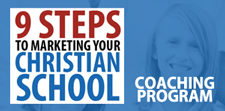

Have you done an honest assessment of the families who are enrolled in your school? I’m talking about an honest assessment.
- Are they 100% mission-appropriate? Are they aligned with your mission?
- Are they misfits who, according to the definition above, are students (and their families) “who fit badly” or are “poorly adapted”?
Regardless of the type of school you are (covenant or evangelical), you have to be selective in who sits in your seats. If you are a Christian school, there are some in your community will find that word “selective” as repugnant. They will equate your existence with that of the Lord’s church where we are to be loving, accepting, and welcoming to all. But as a school, you are a not-for-profit business that must think of the “product” you are providing. If families look at your school and do not perceive the fruit as being sweet, they will pass. If current families start to feel that “one bad apple spoils the bunch” (to stay on the fruit metaphor), they will leave before they are damaged.
There is not one algorithm or list of factors that you must use to ensure you are selecting mission-fit families. But here are a few of the most common and most important:
- Do they agree with your school’s mission, vision, and core values?
- Do they agree with your school’s approach to discipline from actions in or out of the classroom?
- Do they agree with your school’s approach to monitoring and correcting behavior even at home?
- Do they not only agree with but also consider themselves ambassadors for your school’s mission?
- Do they help you market the school via word-of-mouth?
In a time when enrollments can trend downward (as the price tag increases and the value of private education is often debatable among your market), it is easily justifiable for a school to loosen the evaluation and accept anyone with interest and the bank account to afford the school. If you do not mandate mission appropriateness, you will find yourself pulling your hair out in the future.
You may have a much more detailed list of factors when determining whether a student is accepted or not (based on their academic assessment, behavioral history at other schools, letters of recommendations, etc.), but one of them has to be whether or not this student and their parent(s) are mission-fits with your school.
If you need help in ensuring your school has an effective marketing system to ensure you have the most mission-fit families, I want to help. Click the link below and let’s start a conversation.



Over the years of helping Christian schools around the country, I have seen the value of leadership questioning, listening, and schools making the necessary adjustments to grow their enrollment.
Many of you have heard it said, “God gave you 2 ears and only 1 mouth.” Even in the Bible, James says, “Be quick to listen, but slow to speak.” Questions are an important part of learning what people like, learning what they don’t, and learning what are the priority issues to address to change the trajectory of enrollment. Here are some key areas to ask questions:
PRE-ENROLLMENT
Your admissions team should be great question-askers. Before you talk about the school, ask your future families to talk about themselves. Remember this mantra: “it’s not about you, it’s about them.” While you want to sell them on your school, your interest in their situation will be the first step in convincing them that your school is best for their family. If it’s all about you, then future families start to hear a canned speech and they can smell that from a mile away!
- “What do you like to do outside of school?”
- “What are you favorite subjects in school? Least favorite?”
- “If you do make a change from public to private school, what would imagine being the best part? hardest part?”
- “Who are you rooting for in the championship game this weekend?”
- “Who has been your favorite teachers in the past few years and why?”
- “What makes it hard to fit in where you are?”
- “Are you interested in one particular sport or are you willing to try new ones?”
One of the things I teach my Christian school clients is to learn the “need/problem/pain/frustration/fear” of their ideal family (target market). The way you discover this is a series of questions. You can then use the answers given in your marketing so you can address not only the important things about your school, but you can show them that your school can be the answer to their need, the solution to their problem, and the alleviation of their fears.
ENROLLMENT PROCESS
As you walk through the enrollment process with a new family, always ask questions:
- “Does the paperwork make sense?” or “Did you find the online application intuitive?”
- “What are you most excited about coming to our school?”
- “What are the things that make you the most nervous about starting a new school?”
- “Do you have any questions about dress code, start times, schedules, etc.?”
- “Have you had a chance to meet your principal? the head of school?”
- “Would you like to join our Parent Teacher Organization?”
- “Is there anything we can improve in the new family orientation?”
FIRST 100 DAYS
Especially with your new families, you need to ask some questions within the first few months of school (like before Thanksgiving):
- “How are you/How is your child fitting in? Friends yet?”
- “Are we delivering what we promised? Is there something way different than you thought it was going to be?”
- “What has been the hardest part of transition to a new school?”
- “What could we have told you before school started that would have helped make your first few months better?”
- “What teacher/administrator/coach has made the most impact so far?”
- “Is there a teacher/administrator/coach that rubbed you the wrong way or that you are having difficulty with?”
- “What have you witnessed that has surprised you? (good and bad)”
PARENT SATISFACTION
A formal parent satisfaction survey/interview is always worth doing. I prefer finding this information out mid-semester, in hopes that you have time to make adjustments (or at least a pledge for future changes) before re-enrollment decisions are made in the spring. If you survey in May, you get parents and students who are busy, stressed and tired anyway, so they are likely not as positive about the school as you might hope. Plus, their responses give you little time to work on anything. Those who are fed up have already checked out mentally and likely already checked out other schools (maybe even applied to a few).
- Measurable Questions: quantitative questions allow students/parents to rate various categories/topics/programs/people on a numbering scale. This allows you to do some data analysis at the end, averaging numbers to give you tangible (and easy-to-understand) snapshots about how your constituents think. If you survey 100 people and on average, they rate your internal communication as a 4 out of 10, then you have some work to do. As well, if you see that they rate your school an average of 8 on academic quality in the high school, then you can rest easy and encourage your teachers with good feedback.
- Open-Ended Questions: qualitative questions give more opportunity for individuals to expand their responses. In an online survey (or paper survey), people can write out their thoughts that will give you anecdotal evidence. It also might give some explanation why you have a low average rating on the sports program. If you are just looking at the quantitative results, you could draw conclusions that the head coach is terrible. But more elaborate responses might give you clues that it is a triangle of 3 assistant coaches that are really the source of the problem. Perhaps the head coach can be more intentional in addressing issues, but you may want to do more corrective action around the other 3 coaches if stories start to emerge. I’ve seen this happen (not with a sports program, but something similar). While it takes more time, I think beyond a paper or online survey, actual interviews with students and parents provide a wealth of information and insight. You might be able to have someone on the inside to elicit honest responses in a safe environment. If you need an outside entity, I have done this on multiple occasions. I ask, listen, and collect the data to provide some suggestions on improvement/change.
EXIT INTERVIEW
Rarely do you ever want a family to leave but if they do go, do whatever you can to ask them some questions. Keep it simple:
- What is one program, person or policy that we could have changed/adjusted that might have caused you to rethink your decision to leave?
- Do you see any area of strength of our school that you will miss?
The last question may seem odd here, but I suspect more often than not, a family does not leave because they want to. They usually felt driven out by a particular issue. Finances can be the cause, but oftentimes, it is only the cover cause. There may be a problem with a particular administrator or lack of a program that might be true impetus for their departure. But in the end, most departing families will still have some good things to say about the school. They may say, “we just have to find a school that’s better equipped for my child who has an interest in band, but we are going to miss the family atmosphere and my son is really grieving that he won’t get to have Mrs. Johnson for French next year.”
THOUGHTS ON EXIT INTERVIEWS:
- ANONYMITY: Always send a link to an anonymous online survey. Keep it short, but ask questions where they can rate you numerically in various categories. But also give them an open-ended box to write all they want. Assure them repeatedly of the anonymity. Ask them to be brutally honest. Don’t just say, “Is there any way we can improve?” Ask them, “How did we get it wrong?” The latter ensures them that you are wanting true answers. I also recommend that, when possible, invite people to step out of their anonymity and share more details with the head of school via email. Some people do not care about the anonymity but just want to be heard. Absorbing their rage via email or in person decreases the chances that they write a nasty online review in frustration.
- IN-PERSON: Always try and get a sit-down interview with someone in leadership, preferably the head of school or vice president. Let this be a listening situation, not a time for the school to defend itself or to try and explain why the family is getting it wrong. Just listen. In this way, you are hoping to absorb as much hostility as there might be. The last thing you want a family to do is to leave mad, and then blast you with a really negative 1-star review on Google or Yelp. Take the honest feedback, listen well, and where appropriate, apologize or express regret/remorse over how the school did not measure up to their expectations. You want to have the family leave admitting that they were at least heard. Sometimes (though rare) this might change a mind on the spot, or maybe after a year of trying the new school, they return. Always end the conversation with, “we hate to lose any family that shares our mission. If you ever find yourself in a place of wanting to return, we would welcome the opportunity to discuss what changes we might have made to improve to make our school even better.” Of course this does not apply if you perceive the family not to be mission-appropriate, but if they are a good fit, do what you can to reach out in hopes that they might reach out to you again some day. Who knows? Perhaps they might say to a friend, “well, it didn’t work out for our family, but if you are looking for a school that feels like family, you need to try it out yourself.” That’s much better than a negative 1-star review on Google!
The great Christian motivational sales guru, Zig Ziglar, once said,
“Asking the right question and listening to the answer is a great relationship builder, which is important to the persuasion process.”
Are you listening? Or are you just talking?
Email Randy if you would like his help in asking the right questions at your school or to schedule a FREE 30-minute phone consultation.


A while back, I did a post called, “100 Marketing Things To Do 100 Days Before School Starts” (link below). Now that school is back in session, it’s time for a similar post but focused on retention. Because the worst thing you want is to go through all of the trouble to get a new family, only to find out that they have drifted away without even knowing it.
Learn more retention ideas here.
Many of you know that I often talk about the 3 Rs of school marketing:
- RECRUITMENT
- RETENTION
- REFERRALS
There’s a way to look at RETENTION as “re-recruiting” – and I think there is a lot of validity to that interpretation because just because you have a new family seated at your school, there is certainly no guarantee that they will remain a student until they graduate. The odds are in your favor that they will, but you must show INTENTION about RETENTION.
Get ideas now about STOPPING THE DRIFT.
In the first 100 days of school, here is a list of the 5 most critical things to do in terms of re-recruiting families:
- Tell stories – continue writing blog posts, recording podcasts, and shooting videos that tell your school’s micro-stories.
- Follow up – depending on how many new families you had start this year, do your best to follow-up with each one within the first 100 days. If you started school mid-August, then Thanksgiving should be your target. A phone call is best, but an email will suffice. Even a face-to-face at a football game or in the pick-up line would work well (you can be intentional on spotting those families in the parking lot and getting a read on them pretty quickly – if you perceive a problem, invite them to a follow-up phone call or face-to-face conference).
- News and information – one of the hardest things about being a new family is learning the ropes in a new school. A continuous “out of the loop” feeling is hurtful to your re-recruiting efforts. Consider a bi-weekly “New Family” e-newsletter where you can inform them about various traditions around Homecoming, different class schedules on 1/2 days, or specific cut-off dates for High School spring mission trips.
- Leadership touch – invite new families to have coffee with the head of school once a month to talk about the school or shoot a bi-weekly video from your principal talking about a few key items for new families to take note of during the upcoming month.
- Handwritten note – this is so much easier than most schools say it is. If you have 100 new students, then the head of school can start writing one note per day (or batch process 7 of them every Monday morning). Or if you are already 75 days into the 100 days, split the list of new families up by key leadership. Give 10 to the Elementary principal, 10 to the Middle School principal, 10 to the High School principal, another 10 to the Athletic Director, Fine Arts Director, Spiritual Life Director, Admissions Director, teacher, board member and finally, give 10 to a seasoned parent. You could even rotate among this group throughout the year, and a new family could end up getting notes on a monthly basis from someone at your school. Powerful, huh?
In talks on lead generation (growing the pool of potential families), I will always argue that it costs a lot less TIME and MONEY to keep a family (re-recruit them) than it does to initially recruit them. So do not rest on your laurels and assume re-enrollment is a piece of cake. Get after it!
Again, show INTENTION about RETENTION!

Link: “100 Marketing Things To Do 100 Days Before School Starts“
If you are looking for someone to come alongside you this year to help you in your recruitment, retention, and referrals, I would love to talk with you about that. I only take a few new clients each year. I have room for one more to start in 2018. Click here to begin the conversation.


In marketing your school, the Head of School is typically the first face that a prospective parent associates with the school. Therefore it is imperative to showcase your school’s leadership.
The two most important reasons to do this is worth noting:
- REMIND – It is always helpful (and even necessary) to remind your current families of who the administration is at your school. Depending on the size of your school, this is more important. If you are 200 students, perhaps you have more interaction with the Headmaster in the hallways than if your school has 1500 students. For the larger schools, parents typically interact more with teachers, coaches and the principals. If you have administrators over development, enrollment management and curriculum, these are key executives that often go unseen by your current families. Especially important for the Head of School is to be visible on social media, via a blog, Twitter, Instagram or even using Facebook Live to communicate to families.
- INFORM – While you may be very familiar with the face and voice of your school’s president, remember that your prospective families are not. Keep a list of important facts about the HOS’s experience, educational background, expertise, successes, and some of his/her personal traits and share them often. Have a social media calendar that puts a spot each month to feature some aspect of your school’s administration. They are the front-line voice and face for new families.
Now let’s explore some brainstorm ideas on how to showcase your administration (especially the key visible players such as Headmaster, Principals and Coaches).
- VIDEO – Whether you are using Facebook Live, Periscope, YouTube or Instagram video, put your administration out there for people to see! If your administrator is “good on camera” (comfortable and a great communicator), do creative and funny things as well as informative sessions (although keep them brief). If they are not necessarily the best in front of a camera (and some of us are not), use video editing to play a lot of b-roll video so the audience is hearing the administrator but looking at other pictures of your school. Recording presentations or webinars is one way to achieve this if going LIVE terrifies you!
- BLOG – I am still a proponent of a Head of School having a written blog. This is not a place to write 2000 word essays on her educational philosophy. It is a place to share brief stories of student success, institutional success, inspirational stories or personal illustrations that remind/inform families of his/her background. You can write philosophical posts, but keep them brief and break them up into a series of shorter posts with a lot of bullet points and pictures to improve the likelihood of someone reading them.
- AUDIO – President FDR is famous for his “Fireside Chats”. These audio messages provided the President an opportunity to speak directly into the homes of families. Using audio recording and publishing tools like Soundcloud or Podbean (I use both for some random audio messages and for our monthly school marketing podcast), you can publish a 5-, 10-, 20-, or even 30-minute audio message that consistently puts your voice into the minds of your new and current families. Again, use these to do parent/student/alumni interviews or speak to student and institutional successes.
This communication strategy is critical when I help schools install a customized marketing system for their school. If you would like to learn more about my “9 Steps to Marketing Your School” program, signup for this FREE on-demand presentation.


It’s the start of a brand new year. Here are 7 suggestions on content you should consider addressing in this first month of the new year:
- BE RESOLUTE: everyone’s talking about their New Year’s resolutions, so why not chime in with this obviously trending topic? Take a quick poll of your staff and ask them what their resolutions are (get permission first before publishing their names and resolutions). Or offer your own administration’s resolutions for a better school (this is a chance to revisit your vision for the school). Not only do current families need to hear this, but with open enrollment season approaching, prospective families would love to know where you believe the school is headed.
- EPIPHANY: January 6th is a day many Christians celebrate as “Three Kings Day”, recognizing the mission of Christ to reach the Gentile world as seen in the visit of the Magi.
- LAW ENFORCEMENT APPRECIATION DAY: soon after the new year, on January 9th, it’s Law Enforcement Appreciation Day. Go on a field trip to the police station, or have delivered some special thank you cards. This is a great opportunity to develop some community relations. You might consider partnering with some of your feeder system schools to do something special.
- MLK: further down the calendar, do not forget about Martin Luther King day (recognized on the third Monday of January, often recognized as a school holiday). Videos of your students (especially the younger ones) sharing their “dreams” for their world would make cute (dare I say “viral”) content for your social feeds.
- POOH: yes, there’s a National Winnie the Pooh Day (it’s actually in honor of Pooh’s creator A.A Milne’s birthday, January 18th). If the goal is social engagement, Winnie the Pooh can offer a much-needed boost in the doldrums of an often dull January (and speaking of dull, your local media might jump at the chance to cover your school having fun with this holiday on Monday the 18th). With so many great Pooh quotes, you can have some fun on Instagram, Twitter and Facebook (here’s a list of some great Pooh quotables in case you need a reminder). With Pooh quotes like, “A day without a friend is like a pot without a single drop of honey left inside,” you could do short videos from your students about “what makes a good friend” (again, elementary students are prime candidates for cute videos). Or because Pooh could not get enough of his sweet nectar, how about polling your staff about their favorite way to eat honey (current and prospective families love the personal side of staff members). Who wouldn’t love hearing that the head football coach has a special recipe for honey and peanut butter protein bars or that your upper school principal has a secret addiction to Honey Nut Cheerios for breakfast and a late night snack! You might even have someone willing to share their home remedies made from honey.
- BACKWARD DAY: with “Drawkcab Yad” (uh, that would be “Backward Day“) always on January 31st, you can expect some funny memes on Facebook.
- FOOTBALL: while the Super Bowl is not until early February, the month of January will be full of NFL playoff games. Look for local tie-ins (by chance are any of your graduates actually playing in the games?), NFL role models for your students, fun predictions, etc. Also, coming up quick in the new year is the College Football Playoff National Championship game on Monday, January 8th (Georgia vs Alabama) . Like the NFL games, this game will trend on Twitter and Facebook and will no doubt occupy the conversations in your school’s hallways. A couple of years ago, when Heisman trophy winner Marcos Mariota and the Oregon Ducks were in the final game, Columbus Christian Academy in Jackson, MS, did a cool video the week before the national championship of their student athletes commenting on how the Christian faith of Mariota and other top athletes like Tim Tebow inspired them. Watch the video here.
If you need more ideas on having your own content calendar, download our FREE spreadsheet calendar and a complimentary content guide.

And don’t forget to sign up for our Premium “RETENTION” Course. We are in the season of retaining families so this course could be coming at a great time for your school’s marketing efforts.

.
.

If your school offers a PreK program, you know the struggle of keeping those kinds continuing on to Kindergarten. Retention at this traditional “transition year” is a constant struggle (same for the transition from Elementary to Middle/Jr.High and then to High School). It is one of the topics covered in our on-demand premium course, “Retention: Keeping Your Best” (click here to purchase).
BARRIERS TO RETENTION
Here are 5 of the most common reasons why parents will not continue at your private school:
- FREE IS BETTER – the majority of parents may have been paying for private Pre-K, but as long as the public/charter schools in their area are strong, free is always a strong pull!
- LOCATION, LOCATION, LOCATION – whether it is the need for carpool help with neighbors or wanting to have more connections with people who are more geographically proximate, some parents resist the drive it might be to your school. If there is a strong Kindergarten nearby, why would they drive long distances?
- K-12 CONTINUITY – parents who are currently enrolled in a pre-K program that only goes through 4th or 8th grade will say they would prefer that their child start Kindergarten where they will finish. Perhaps they grew up in a public or private K-12 situation and never experienced what they might consider to be “transition trauma” for their child, so they choose a school they will be at for the remainder of their secondary education.
- ALTERNATIVE EDUCATION – some parents have opted for private preschool or Pre-K education, when they begin to think long-term, they are intrigued by alternate options (also see #1) such as homeschool or selection into a charter school.
- MORE OPPORTUNITIES – while you may have some of the sweetest, nicest and kindest Kindergarten teachers, parents often place a high priority on academic readiness. Whether we like or not, in today’s competitive world, technology, programs and facilities often distinguish one school from another in the minds of parents.
WHY YOU NEED TO KEEP YOUR KINDERGARTNERS?
The number reason you should do what you can to keep your Kindergartners is the long-term financial benefit!
Obviously, you have likely done the math. If you have just one Kindergarten who remains until 12th grade, this is likely a $100,000+ benefit to your school over the 13 years of their education (if you are a K-12 school). Even if you are only K4 or K8, you still benefit when you can retain a student rather than having to recruit a new family. Did I mention my course on retention where we cover 5 major topics on anchoring families to your school?
HOW TO KEEP MORE KINDERGARTNERS AT YOUR SCHOOL
- KNOW THE WHY – you have to make a clear case of why a parent should stay on through Kindergarten. This may seem obvious to you, but likely your insider emotion makes you say, “why would they go anywhere else?” In reality, perhaps the parents do not know why your Kindergarten is better than the other Kindergarten options in the area. Survey your current Kindergarten parents and ask them why they stayed. Especially if there are patterns in their responses, use this “market research” to tell you what to market to your potential Kindergarten families.
- ACADEMIC BENEFITS – in differentiating your Kindergarten, clearly articulate why your Kindergarten program is academically superior to your competition. Yes, this will require you being somewhat aware of what the other public/private/home/charter schools cannot offer. And do not be afraid to point out these differences to your current Pre-K families or other potential moms or dads checking out your Kindergarten. Offer a “Checklist for Choosing the Best Kindergarten” and indicate where you shine, especially if you know your competition is weak. Then distribute or offer this checklist to parents and invite them to compare line-by-line to what you have to offer. If you offer Arabic or Spanish in your Kindergarten classes and the others do not, then this is a HUGE part of your marketing message. If you have a specific curriculum that others do not, explain how your curriculum is better. Yes, this means you have to point out the faults of other schools, but you can do it in a nice, discreet way without going super negative.
- GET-TO-KNOW THEM – if you have 2 Kindergarten teachers (let’s say for this post they are both female), then make sure these ladies hang out a lot in the Pre-K classrooms, hallways and at pickup lines. You want your 4-year olds to love these ladies so much that they would cry their eyes out if mom tells them they are attending Kindergarten somewhere else! (ha) Parents should be extremely familiar with the personality, teaching philosophy, and character of your Kindergarten teachers. Have them come once-a-week to your 3s or 4s and read to them in a fun way that makes them excited about transitioning up to Kindergarten with these teachers. Have these ladies reach out through emails or hand-written notes to parents of your 3s and 4s throughout the year so that they are well aware of the many things you have planned for their son or daughter during their Kindergarten year.
- INVITE THEM UP – in the same way your Kindergarten teachers should mingle among the younger kids and their parents, you should have a monthly “Kindergarten Open House” or “Kinder Showcase” where 4s and their parents can explore the fun things the current Kindergarten students get to do. Make it a fun event, give out prizes (to the parents, too) and this could turn into one of your biggest recruiting efforts!
- TELL STORIES OF SUCCESS – get started right away in curing stories of success in written, audio or video format. They can be institution successes or individual stories of success. These are young students without all the extracurricular showcase opportunities, but highlight their personal stories of success anyway! One of the easiest ways to do this is to ask your current Kindergarten parents to write a review online on Facebook, GreatSchools.org or on your school’s Google listing. Even going to parents of older elementary schools can testify to how well prepared your Kindergarten kids are compared to other schools.
- MAKE YOUR KINDER EXPERIENCE THE BEST – it may be the “Kindergarten Dress-Up Day” or a Christmas pageant, but create a phenomenal event for your Kindergarten students that they will insist they want to participate in. Make it such a “WOW! factor” that parents will ignore other schools because they will want their kids to have this experience. The key is truly making it unique! Your dress-up day has to be so much better than the dress-up days they might do at other schools. Your Christmas pageant should be so off-the-charts that local media want to cover it! Do an inventory this year and determine if you can raise up your Kindergarten experience to a whole other level!
Managing these transition years is one of the areas I talk about with 1-on-1 clients through our marketing coaching programs. If you are interested in learning more and getting a complimentary 30-minute phone consultation, click here to get started.

If you want to navigate our premium course on your own time, I would also encourage you to purchase your copy of “RETENTION: Keeping Your Best”!
























